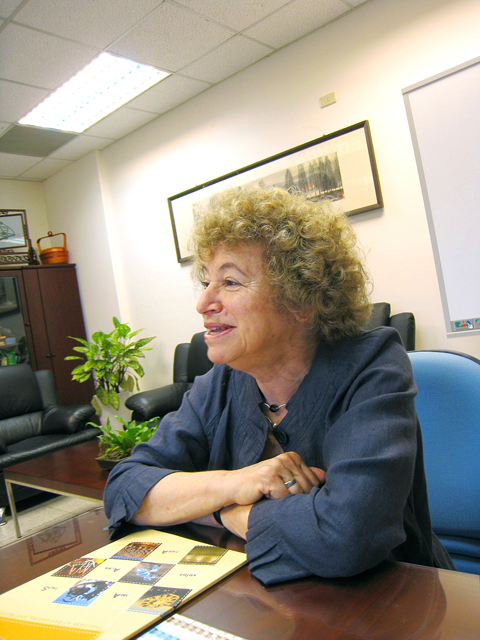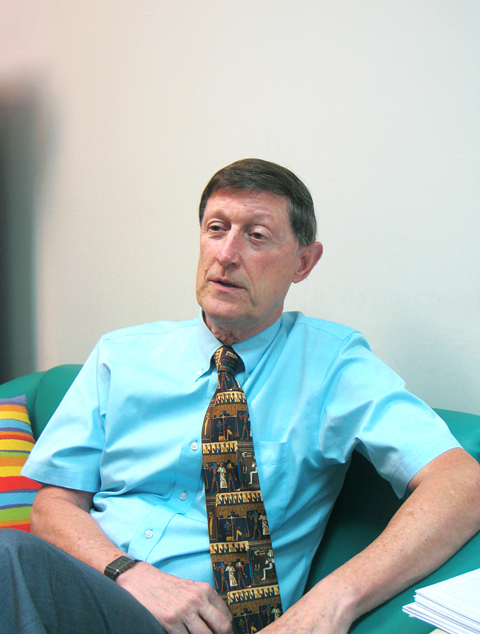Taipei Times (TT): What makes astronomy an important scientific field? What role do you think it plays in people’s lives?
Robert Williams: We live in a world where superstition plays a prominent role — for example, getting a cold by sleeping next to an open window, thunder being caused by the flapping of angel’s wings. I believe that scientific methods are the best vehicle for teaching people and for changing their minds about things.
Astronomy is the best science to introduce people into that type of thinking, because it is there for everyone to see and it is exciting. The quality of people’s lives are enhanced when they know the facts about every type of phenomenon, whether it is human relations, the food we eat or the universe we live in; it is important we understand ourselves.

PHOTO: TAIPEI TIMES, MEGGIE LU
TT: Tell us what you have been working on and why astronomy is interesting to you.
Williams: Spectroscopy is the study of radiation and matter as a function of wavelengths. It turns out that the type of radiation things emit varies, just like fingerprints. Spectroscopy is kind of like solving a crime scene through forensic means. For example, a nova outburst is where one star in a pair of binary stars loses mass to another star. As that mass falls onto the other star, it gradually heats it up to a point that nuclear fusion can take place. It’s an interesting phenomenon. You look into the sky, you see about 6,000 naked-eye stars, most of which are constant and appear century after century, but once in a while, some stars go “ka-blank” — why? If we are going to understand the universe, we need to understand why some stars blow up, while others are just sitting there.

PHOTO: TAIPEI TIMES, MEGGIE LU
Catherine Cesarsky: In the early part of my career I worked in high-energy astrophysics — events where there are big explosions, supernovae or black holes attracting matter at fast speeds. Cosmic rays have collisions with interstellar mediums — clouds between stars — and these collisions emit gamma rays. The study of gamma rays enables us to determine how much matter there is between stars.
In the second part of my career I developed an infrared instrument for a satellite — the ISOCAM camera onboard the Infrared Space Observatory of the European Space Agency [ESO]. With it we studied star formation, faraway galaxies, and we discovered very important things about the evolution of galaxies. For example, we discovered that in galaxies in the past, stars formed at much faster rates than they are now.
TT: With ESO, you collaborated with the Taiwanese team on the Atacama Large Millimeter/submillimeter Array (ALMA) Observatory [a space telescope composed of 66 giant antennas scheduled for completion in 2012 that involves collaboration between US, Canadian, EU, Japanese and Taiwanese scientists]. What are some of your observations?
Cesarsky: ESO has led the European part of the ALMA project since I was the ESO director-general. We talked to the Japanese, and quickly they brought in the Taiwanese. Meanwhile the Americans also made agreements with the Taiwanese, so Taiwan participates [in ALMA] both in the North America and the East Asia parts.
The Taiwanese team has been performing very well. Because they had just worked on the Submillimeter Wave Telescope [SMA], they were better prepared than many to do it. They have delivered very good prototypes that have been accepted as engineering models.
One of the recent important things that it has done is the integration of the receivers for the Japanese part of the project, which was done at the ALMA East Asia Front End Integration Center. Earlier this year, the receivers [the first device the signals reach at the giant telescopes] helped receive ALMA’s first signals from space [in a test run with Mars].
TT: As one of the world’s top female scientists, how do you think the field of science has evolved in terms of including women since you first started? What future changes do you wish to see?
Cesarsky: There are altogether more women in the field, but not overwhelmingly more. In my family, given my age, I had by far the major responsibility in raising my two boys, and I certainly missed opportunities. When I worked on cosmic rays in the US in my early 30s, the biggest competitor in terms of science were Russian scientists. I met a Russian scientist in Europe, who later won a Nobel Prize, and he said, “So, you are Cesarsky? I thought you were a grown woman!” I don’t think people are surprised now if a young woman comes to do with science; in most places women are better accepted than they used to be. However, the level of acceptance and the involvement of women in science vary enormously from country to country.
In the future I would be very happy if we don’t pay attention to whether a scientist is a man or a woman, ideally the ratio would reach 50-50. I want to see that it is made easier for women scientists to have a career and a family at the same time. My advice to aspiring young female scientists is to go for everything — you can have it all. Not having a family is not a solution at all to having a career. I certainly would never have gone without having children.
TT: What is the goal of the International Year of Astronomy 2009?
Cesarsky: The goal is to help as many people as we can to feel their place in the universe, including in countries where there is not yet astronomy. We want people to enjoy the beauty of the sky, and if possible to also understand that behind this beauty, there is much to discover. We are in the Golden Age of astronomy. Whereas just 15 years ago, we were only studying the universe close to us, we now have very sensitive instruments to study the whole history of the universe. We can now see very far away, which means we can see very far away in time.
Williams: I would say the two most important discoveries in the past were that the universe is expanding, and the discovery of the existence of planets around other stars. In a few hundred years, science will allow us to probe what happened before the Big Bang. And some day in the near future, we will discover Earth-like planets and begin characterizing them.

SHIPS, TRAINS AND AUTOMOBILES: The ministry has announced changes to varied transportation industries taking effect soon, with a number of effects for passengers Beginning next month, the post office is canceling signature upon delivery and written inquiry services for international registered small packets in accordance with the new policy of the Universal Postal Union, the Ministry of Transportation and Communications said yesterday. The new policy does not apply to packets that are to be delivered to China, the ministry said. Senders of international registered small packets would receive a NT$10 rebate on postage if the packets are sent from Jan. 1 to March 31, it added. The ministry said that three other policies are also scheduled to take effect next month. International cruise ship operators

HORROR STORIES: One victim recounted not realizing they had been stabbed and seeing people bleeding, while another recalled breaking down in tears after fleeing A man on Friday died after he tried to fight the knife-wielding suspect who went on a stabbing spree near two of Taipei’s busiest metro stations, Taipei Mayor Chiang Wan-an (蔣萬安) said. The 57-year-old man, identified by his family name, Yu (余), encountered the suspect at Exit M7 of Taipei Main Station and immediately tried to stop him, but was fatally wounded and later died, Chiang said, calling the incident “heartbreaking.” Yu’s family would receive at least NT$5 million (US$158,584) in compensation through the Taipei Rapid Transit Corp’s (TRTC) insurance coverage, he said after convening an emergency security response meeting yesterday morning. National

The Forestry and Nature Conservation Agency yesterday launched a gift box to market honey “certified by a Formosan black bear” in appreciation of a beekeeper’s amicable interaction with a honey-thieving bear. Beekeeper Chih Ming-chen (池明鎮) in January inspected his bee farm in Hualien County’s Jhuosi Township (卓溪) and found that more than 20 beehives had been destroyed and many hives were eaten, with bear droppings and paw prints near the destroyed hives, the agency said. Chih returned to the farm to move the remaining beehives away that evening when he encountered a Formosan black bear only 20m away, the agency said. The bear

PLANNED: The suspect visited the crime scene before the killings, seeking information on how to access the roof, and had extensively researched a 2014 stabbing incident The suspect in a stabbing attack that killed three people and injured 11 in Taipei on Friday had planned the assault and set fires at other locations earlier in the day, law enforcement officials said yesterday. National Police Agency (NPA) Director-General Chang Jung-hsin (張榮興) said the suspect, a 27-year-old man named Chang Wen (張文), began the attacks at 3:40pm, first setting off smoke bombs on a road, damaging cars and motorbikes. Earlier, Chang Wen set fire to a rental room where he was staying on Gongyuan Road in Zhongzheng District (中正), Chang Jung-hsin said. The suspect later threw smoke grenades near two exits